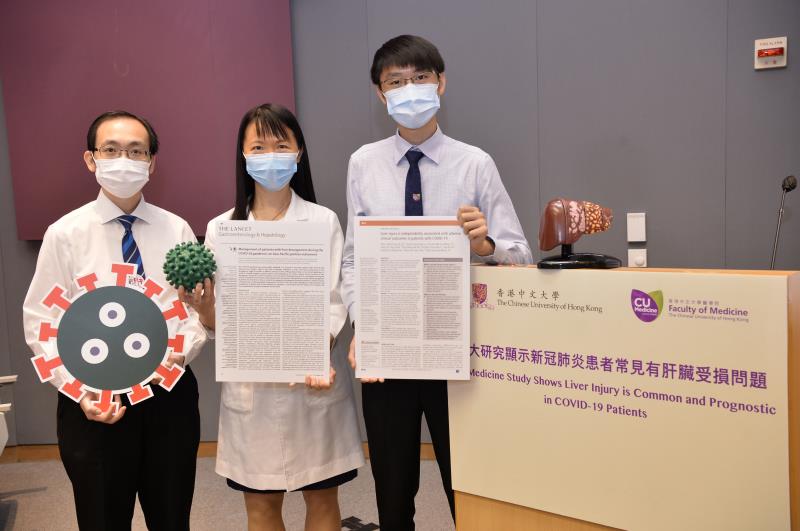Managing liver derangement in COVID-19: Recommendations for clinicians




 From left: Prof Vincent Wong, Prof Grace Wong, Dr Terry Yip
From left: Prof Vincent Wong, Prof Grace Wong, Dr Terry YipIn view of the prevalence and prognostic significance of liver derangement in patients with coronavirus disease 2019 (COVID-19), the Asia-Pacific Working Group for Liver Derangement during the COVID-19 Pandemic has issued practical recommendations on 12 clinical scenarios commonly encountered by physicians.
The Working Group, led by hepatologists from the Chinese University of Hong Kong (CUHK) and comprising experts from mainland China, Japan, Singapore and Australia, recommends liver function testing in all hospitalized patients with COVID-19 (strength of recommendation, 1; quality of evidence, C). [Lancet Gastroenterol Hepatol 2020;5:776-787]
While the optimal interval for liver function testing is uncertain, twice-weekly monitoring would be reasonable in patients on potentially hepatotoxic medication and those with pre-existing liver disease; more frequent monitoring is recommended in patients with abnormal liver function (strength/quality, 2C).
“Another common question is whether patients with COVID-19 and chronic hepatitis B virus [HBV] infection should be started on antiviral therapy for HBV after the development of liver derangement,” said Professor Grace Wong of the Division of Gastroenterology and Hepatology, CUHK.
“In general, antiviral therapy for HBV should be started according to existing international guidelines [strength/quality, 1A],” she continued. “If systemic corticosteroids or other potent immunosuppressants [eg, tocilizumab] are used as COVID-19 therapy for ≥7 days, screening for hepatitis B surface antigen is recommended; antiviral therapy for HBV should be initiated to avoid HBV reactivation and hepatitis flare in patients with known HBV infection [strength/quality, 1B].”
In addition, the Working Group noted that concomitant use of tenofovir disoproxil fumarate (TDF) or tenofovir alafenamide (TAF) with lopinavir-ritonavir is relatively contraindicated, as this may increase the drug level of tenofovir; as such, patients may be temporarily switched to entecavir during lopinavir-ritonavir treatment, if entecavir resistance is absent (strength/quality, 1B).
“To avoid the risk of HBV reactivation and clinical flare, oral nucleoside antiviral therapy for HBV should not be stopped at the time of COVID-19 infection [strength/quality, 1B],” pointed out Wong.
The recommendations also cover assessment and management of COVID-19 patients with chronic hepatitis C, nonalcoholic fatty liver disease, cirrhosis, hepatocellular carcinoma, and liver transplantation during the pandemic.“COVID-19 patients with abnormal liver function are commonly encountered in clinical practice. As the causes of liver impairment in COVID-19 patients and the hepatotoxicity of new antiviral drugs are to be studied, experts in our group joined hands with the hope of providing the most appropriate care at this critical time. We strongly believe that these recommendations will be beneficial to healthcare professionals in the Asia-Pacific region and around the world,” said Professor Vincent Wong, Head of the Division of Gastroenterology and Hepatology, CUHK.
In a recent study in 1,040 patients with COVID-19, the CUHK researchers found alanine aminotransferase (ALT)/aspartate aminotransferase (AST) elevation in 22.5 percent of patients and acute liver injury in 1.8 percent of patients. ALT/AST elevation and acute liver injury were each independently associated with intensive care unit admission, use of invasive mechanical ventilation and death (adjusted odds ratio [aOR] for ALT/AST elevation, 7.92; 95 percent confidence interval [CI], 4.14 to 15.14; p<0.001) (aOR for acute liver injury, 6.40; 95 percent CI, 1.78 to 23.07; p=0.005). [Gut 2020, doi: 10.1136/gutjnl-2020-321726]
“Although the exact impact of the novel virus on the liver has not been well elucidated so far, our findings show that liver injury is prognostically significant in COVID-19 patients,” said Dr Terry Yip of the Department of Medicine and Therapeutics, CUHK.